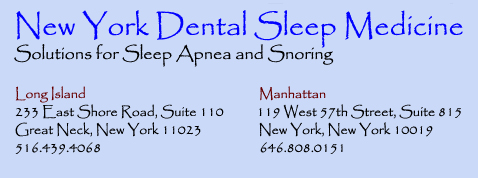 |
 |
  |
- How do I know if I have Sleep Apnea or just Snore?
- How do I know what form of Treatment I Need?
- How do I know which Oral Appliance to Get?
- How do Oral Appliances Work?
- Does Oral Appliance Therapy always work?
- Will Oral Appliance Therapy correct things Immediately?
- Does insurance cover the cost of Oral Appliance Therapy?
- What are the side effects of Oral Appliance Therapy?
- What happens in the Office?
How do I know if I ave Sleep Apnea or just Snore?
Snoring, even without daytime sleepiness, or multiple awakenings is usually just snoring, but may still be sleep apnea. The only way to know is to be evaluated by a sleep physician. Once the nature and severity of the problem is determined, appropriate care can be prescribed. Not having sleep apnea treated can be life threatening with increased chances for stroke, heart attack, and hgh blood pressure. Talk it over with your physician or with Dr. Fischman and you will get on the right path.
How do I know what form of Treatment I need?
There are three treatment choices for Sleep Apnea: CPAP, Surgery, and Oral Appliance Therapy. CPAP resolves almost all issues, but for mild to moderate obstructive sleep apnea is an extreme when compared to Oral Appliance Therapy. Surgery is very specific problems usually related to the soft palatate, Tonsils and nasal septum. After you have been diagnosed,
For Snoring the options are Oral Appliance Therapy and Surgery. The Surgery is very specific problems usually related to the soft palatate, Tonsils and nasal septum. Oral Appliance Therapy resolves most cases of Snoring.
How do I know which Oral Appliance To Get?
Once it has been determined that Oral Appliance Therapy is appropriate care for you, the decision about which appliance should be used will be made by Dr. Fischman based on your oral anatomy, test results, and your habits.
Obstructive Sleep Apnea and snoring have similar causes. Constriction of the airway at the base of the tongue and the throat (pharynx) that blocks the airway. By moving the lower jaw forward the tongue, which is attached to the mandible, is pulled forward. This opens the airway and allows normal breathing as well as an elimination of snoring. Oral Appliances are only to be worn at night, and only relieve symptoms when they are being used.
Does Oral Appliance Therapy always work?
For snoring, Oral Appliance Therapy almost always works. For mild to moderate sleep apnea it is very successful. For severe sleep apnea patients who can't tolerate CPAP there are significant reductions in the severity of the sleep apnea, though the chances of resolution drop off dramatically as the severity increases. In all uses of Oral Appliance Therapy the devices constructed by our office are adjustable and a period of refining the jaw position may be necessary to realize the maximum benefit
Will Oral Appliance Therapy correct things immediately?
Oral appliance therapy involves titration (changes according the results) of the jaw position. This means that the first night might not be the best things can be. In addition some patients require a few days to accomodate to the device. So the answer to this is maybe.
Does insurance cover the cost of Oral Appliance Therapy?
Most medical insurance policies have benefits for Oral Appliance Therapy with a diagnosis of Obstructive Sleep Apnea. With a diagnosis of simple snoring, most policies do not currently pay for the therapy. However, for a snorer, whose bed partner gets no sleep, or sleeps in another room, Oral Appliance thereapy is a great chance to improve ones home life and the quality of life of the one suffering from Second Hand Snoring.
What are the side effects of Oral Appliance Therapy?
Oral Appliance Therapy often has minor problems associated with it. When first placed in the mouth, it is interpreted as food by the mouth, and there can be excessive salivation; this tends to stop in a few minutes. During a night of use, the jaw is positioned in a forward position. Upon awakening the teeth won't meet properly, and we happens give you exercises to help get the jaw rapidly back into proper alignment. There may be some muscle discomfort after the overnight stretch.
Over a long term, there may be some movement of the teeth, after all, they are the anchors for the Oral Appliances. The most common form of this is spaces opening between some of the teeth which can usually be corrected with simple fillings.
Dr. Fischman will examine your teeth and mouth to confirm your oral health status. After confirmation that Oral Appliance Therapy is the best treatment option for you, dental impressions will be taken to fabricate your custom made oral appliance. Once you have been wearing your appliance regularly and symptoms such as snoring and/or daytime sleepiness have been reduced, Dr. Fischman may give you an overnight test or refer you back to your physician to for another sleep test to maximize the effectiveness of the appliance. Regular recall visits to Dr. Fischman are important to maintain and/or modify your oral appliance over time.
Tell Your Doctor | Q & A | Contact Us | Testimonials | Resources | About Dr. Fischman | Map & Directions | New patient Forms